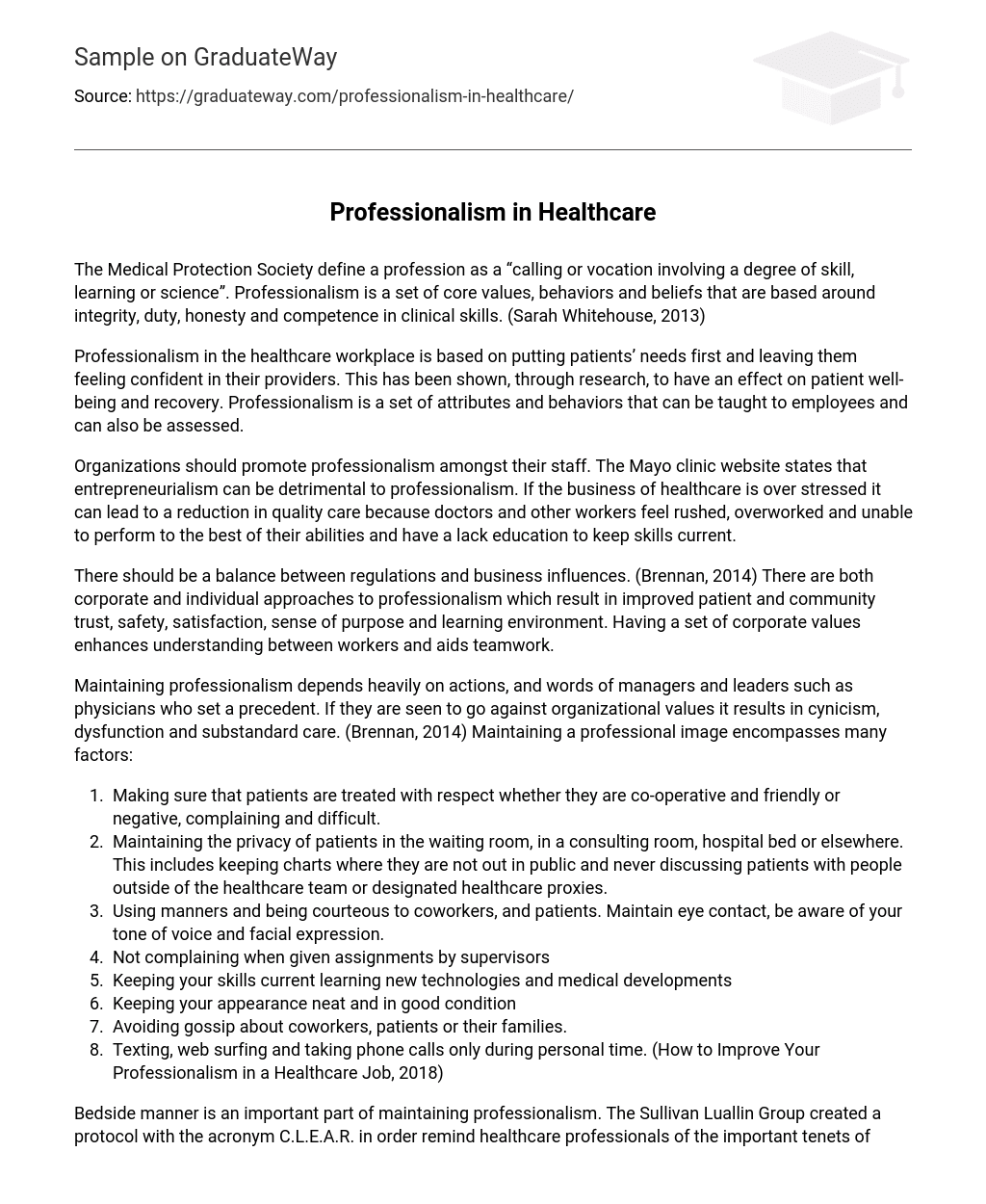The Medical Protection Society define a profession as a “calling or vocation involving a degree of skill, learning or science”. Professionalism is a set of core values, behaviors and beliefs that are based around integrity, duty, honesty and competence in clinical skills. (Sarah Whitehouse, 2013)
Professionalism in the healthcare workplace is based on putting patients’ needs first and leaving them feeling confident in their providers. This has been shown, through research, to have an effect on patient well-being and recovery. Professionalism is a set of attributes and behaviors that can be taught to employees and can also be assessed.
Organizations should promote professionalism amongst their staff. The Mayo clinic website states that entrepreneurialism can be detrimental to professionalism. If the business of healthcare is over stressed it can lead to a reduction in quality care because doctors and other workers feel rushed, overworked and unable to perform to the best of their abilities and have a lack education to keep skills current.
There should be a balance between regulations and business influences. (Brennan, 2014) There are both corporate and individual approaches to professionalism which result in improved patient and community trust, safety, satisfaction, sense of purpose and learning environment. Having a set of corporate values enhances understanding between workers and aids teamwork.
Maintaining professionalism depends heavily on actions, and words of managers and leaders such as physicians who set a precedent. If they are seen to go against organizational values it results in cynicism, dysfunction and substandard care. (Brennan, 2014) Maintaining a professional image encompasses many factors:
- Making sure that patients are treated with respect whether they are co-operative and friendly or negative, complaining and difficult.
- Maintaining the privacy of patients in the waiting room, in a consulting room, hospital bed or elsewhere. This includes keeping charts where they are not out in public and never discussing patients with people outside of the healthcare team or designated healthcare proxies.
- Using manners and being courteous to coworkers, and patients. Maintain eye contact, be aware of your tone of voice and facial expression.
- Not complaining when given assignments by supervisors
- Keeping your skills current learning new technologies and medical developments
- Keeping your appearance neat and in good condition
- Avoiding gossip about coworkers, patients or their families.
- Texting, web surfing and taking phone calls only during personal time. (How to Improve Your Professionalism in a Healthcare Job, 2018)
Bedside manner is an important part of maintaining professionalism. The Sullivan Luallin Group created a protocol with the acronym C.L.E.A.R. in order remind healthcare professionals of the important tenets of good communication.
Connect- be friendly, make eye contact, use the patients name & simple manners such as please and thank you Listen- keep eye contact, actively listen, record information, repeat for accuracy Explain- be patient answering questions, speak slowly, describe procedures in a way that can be understood Ask- if the patient understood, do they have any more questions and is there anything else they need Re-connect- make sure the patient is ok if waiting, direct them carefully and part with a friendly comment (Britt, 2013)
It is a guide to aid community members, boards of trustees, policy makers and all healthcare workers assess and discuss matters in healthcare professionalism in four focus areas: patient partnerships; organizational culture; community partnerships and operations and business practices. (Mason, 2017)
Hopefully with heightened awareness of the need for professionalism and education of workers in the healthcare industry, quality of patient care will be improved and satisfaction in the workplace increased.





